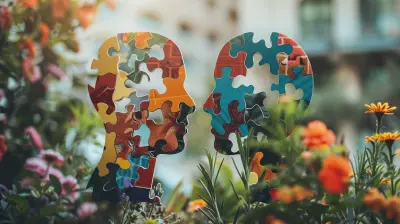The Role of Exercise in Managing Mental Illness
27 May 2025
Mental health is a bit like the weather. Some days are sunny, bright, and clear, while others seem to carry a cloudy haze that just won’t lift. For those dealing with mental illness, those cloudy days can feel never-ending. While therapy, medication, and lifestyle changes are common methods of managing mental health conditions like depression, anxiety, or PTSD, there's another tool that often gets overlooked—exercise.
Yes, that’s right! Moving your body isn’t just about getting toned muscles or improving your heart health. It’s also a powerful way to boost your mental well-being. But how exactly does exercise help, and why should you consider incorporating it into your mental health management routine? Let’s dive in and explore the fascinating connection between physical activity and mental wellness.

Why Exercise Matters for Mental Health
Ever noticed how you feel after a brisk walk, a gym session, or even a yoga class? Chances are, you feel a little lighter, both physically and mentally. That’s because exercise has a profound effect on your brain chemistry.When we move our bodies, our brains release a cocktail of feel-good chemicals—endorphins, serotonin, and dopamine—that can help decrease feelings of sadness, anxiety, and stress. It’s like nature’s antidepressant! Exercise also promotes better sleep, improves self-esteem, and provides an outlet for pent-up energy and frustration.
But it’s not just about the "feel-good" factor. Science backs this up. Studies have shown that regular physical activity can reduce symptoms of depression and anxiety, sometimes as effectively as medication or therapy for some individuals. But how does this happen? Let’s break it down.
Exercise and Brain Chemistry
When you exercise, your brain is getting a workout, too. The brain releases several key neurotransmitters that play a direct role in mood regulation.- Endorphins: These are your body's natural painkillers and mood elevators. Sometimes referred to as "runner’s high," endorphins help reduce your perception of pain and trigger a positive feeling in the body.
- Serotonin: This neurotransmitter is often associated with feelings of happiness and well-being. Many antidepressant medications target serotonin levels in the brain, but exercise can naturally boost serotonin production.
- Dopamine: Dopamine is involved in the brain’s reward system. The satisfaction and pleasure you feel after completing a workout? That’s dopamine doing its job.
- Norepinephrine: This chemical helps to moderate your brain’s stress response, essentially helping you stay cool under pressure.
Collectively, these chemicals create a snowball effect that can help reduce feelings of sadness, anxiety, and stress.

The Mental Health Benefits of Different Types of Exercise
Not all exercise is created equal, and the type of activity you choose can influence how you feel mentally. The good news? There's something for everyone! Whether it’s a high-intensity workout or a calming yoga session, different forms of physical activity bring their own mental health benefits.1. Cardiovascular Exercise
If you've ever felt your mood lift after running, biking, or swimming, you can thank cardiovascular exercise for that. Also known as aerobic exercise, these activities get your heart rate up and increase oxygen flow to the brain. This helps improve cognitive function and reduces feelings of anxiety and depression.Cardio is especially effective at reducing anxiety. Why? Because it mimics some of the symptoms of anxiety—like a rapid heartbeat and sweating—but in a controlled way. Over time, this helps your brain learn to interpret these sensations as safe, rather than a threat.
2. Strength Training
Lifting weights or engaging in resistance training isn’t just about building muscle. Strength training has been shown to reduce symptoms of depression. There's something incredibly empowering about lifting heavy weights or mastering a new movement. It boosts self-esteem and brings a sense of accomplishment, which can be particularly beneficial for people struggling with low mood or self-worth.Strength training can also improve sleep, and we all know how crucial sleep is for mental well-being. Better sleep means better mood regulation and less brain fog during the day.
3. Yoga and Mind-Body Exercises
It’s no surprise that yoga and other mind-body exercises like Pilates and Tai Chi are often recommended for mental health. These practices emphasize mindfulness, which is the practice of staying present in the moment. This can help reduce rumination, which is when your mind gets stuck in negative thought loops, a common symptom of anxiety and depression.Yoga has been found to decrease levels of the stress hormone cortisol, while increasing levels of GABA, a neurotransmitter that has a calming effect on the brain.
4. Outdoor Activities
There’s something about being in nature that just makes us feel better, right? Outdoor activities like hiking, biking, or simply walking in the park combine the benefits of exercise with the mood-boosting effects of being in nature.Studies show that spending time in green spaces can reduce stress, anxiety, and symptoms of depression. So, if you're feeling stuck in a mental rut, getting outside for some fresh air and sunshine might be exactly what you need.

The Link Between Exercise and Specific Mental Health Conditions
Now, let's drill down a bit further and look at how exercise can help manage specific mental health conditions. While exercise is beneficial for general mental well-being, its effects can be particularly potent for certain disorders.1. Depression
Depression is one of the most common mental health issues, and exercise can be a powerful tool in combating it. Physical activity increases the production of endorphins and serotonin, both of which play a role in mood regulation. For many, regular exercise can be just as effective as antidepressant medication in reducing symptoms of depression.A study published in the Journal of Psychiatric Research found that people who engaged in regular physical activity were 25% less likely to develop depression. And for those already struggling with depression, exercise can significantly reduce symptoms in as little as four weeks.
2. Anxiety
For people with anxiety disorders, exercise can serve as a natural form of exposure therapy. When you exercise, you experience physiological changes like increased heart rate and sweating—symptoms that are often associated with panic attacks. By engaging in regular physical activity, you can retrain your brain to associate these sensations with something positive, rather than fear.Additionally, exercise helps reduce muscle tension, lowers blood pressure, and decreases cortisol levels, all of which contribute to a calmer, less anxious state of mind.
3. PTSD (Post-Traumatic Stress Disorder)
Exercise can play a crucial role in managing PTSD, particularly when it involves group activities or exercises that focus on mindfulness, like yoga. For individuals with PTSD, exercise offers a safe way to reconnect with their bodies and regain a sense of control. Movement-based therapies, such as dance or martial arts, have also shown promise in helping people process traumatic experiences.4. ADHD (Attention-Deficit/Hyperactivity Disorder)
For individuals with ADHD, exercise can help improve focus, reduce impulsivity, and increase dopamine levels. High-intensity activities like running or martial arts can be particularly effective at burning off excess energy and improving concentration.
How to Get Started If You’re Struggling
If you’re dealing with a mental health condition, the idea of adding exercise to your routine might feel overwhelming. And that’s totally okay! Start small. Even a 10-minute walk can make a difference. You don’t have to dive into intense workouts right away.The key is consistency. Try to make exercise a regular part of your routine, even if it’s just a few times a week. It’s not about hitting the gym for hours on end. It’s about finding movement that feels good to you and sticking with it.
Tips for Getting Started:
- Start with small goals: Aim for 10-15 minutes of activity a few times a week.- Find something you enjoy: Whether it’s dancing, swimming, or yoga, pick an activity that feels fun.
- Recruit a buddy: Exercising with a friend can help you stay motivated and make the experience more enjoyable.
- Celebrate small wins: Give yourself credit for showing up, no matter how small the effort.
Conclusion
Exercise isn’t a cure-all for mental illness, but it’s a powerful tool that can complement other treatments like therapy or medication. It’s like adding another weapon to your mental health arsenal. Whether it’s the release of feel-good chemicals, the sense of accomplishment from completing a workout, or simply the stress relief from moving your body, exercise is a natural way to boost your mood and manage symptoms of mental illness.So, if you’re feeling low, anxious, or stressed, try lacing up your shoes and moving your body. You might just find that exercise is the mental health boost you didn’t know you needed.
all images in this post were generated using AI tools
Category:
Mental IllnessAuthor:

Gloria McVicar
Discussion
rate this article
3 comments
Kristina Wood
Exercise significantly enhances mental well-being, providing a natural boost to mood and reducing symptoms of anxiety and depression.
June 14, 2025 at 2:51 AM

Gloria McVicar
Absolutely! Exercise is a powerful tool for improving mental health, offering both immediate mood elevation and long-term benefits in managing anxiety and depression.
Dash McConnell
This article highlights the crucial connection between exercise and mental health. Engaging in regular physical activity can significantly alleviate symptoms and improve overall well-being for those with mental illness.
June 1, 2025 at 2:39 PM

Gloria McVicar
Thank you for your insightful comment! I'm glad you found the connection between exercise and mental health important. Regular physical activity can truly be transformative.
Seth McMaster
Exercise has been shown to significantly improve mental health outcomes by reducing symptoms of anxiety and depression. Regular physical activity enhances mood, boosts self-esteem, and promotes overall well-being, making it a vital component in managing mental illness effectively.
May 27, 2025 at 2:49 AM

Gloria McVicar
Thank you for highlighting the crucial link between exercise and mental health. It's encouraging to see how physical activity can positively impact mood and overall well-being.



